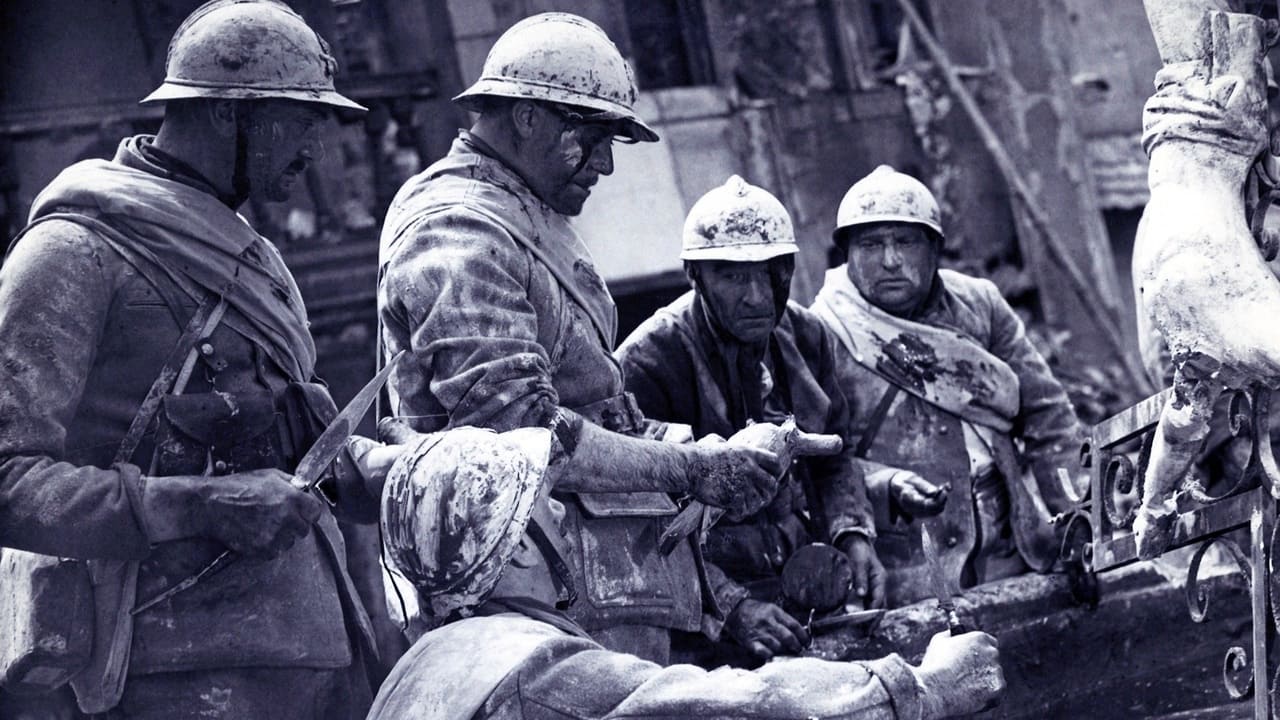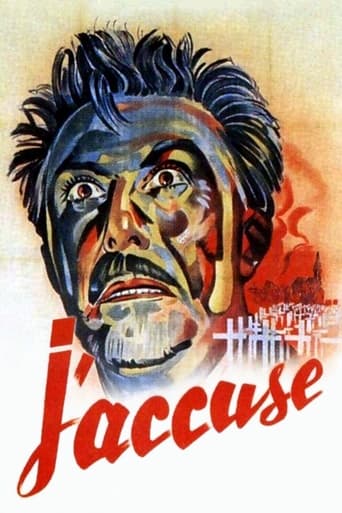Redwarmin
This movie is the proof that the world is becoming a sick and dumb place
UnowPriceless
hyped garbage
Teringer
An Exercise In Nonsense
Teddie Blake
The movie turns out to be a little better than the average. Starting from a romantic formula often seen in the cinema, it ends in the most predictable (and somewhat bland) way.
mifunesamurai
An important film for its time with a powerful message that only fell on deaf ears when World War II went ahead. Unfortunately, the film was technically flawed with some campy moments and a messy story structure. Still, the ending is a classic.
delbruk
J' Accuse! is one of those imperfect films that have so many captivating and remarkable scenes as to burn them into memory forever. From the first 45 minutes concentrating on the battleground of the first World War that rivals All Quiet On The Western Front to the final half hour of surrealist horror/fantasy that evokes the groundwork for such films as Night of the Living Dead there is much to love about this work.The editing and use of actual stock war footage actually brings the viewer a historical grounding for the social and moral stance the film takes. The special effects are in grand display for a film of the 1930s and eerily successful during the climax which is one of the truly great accomplishments in cinematic history.The only drawbacks for the film is depending on your version/copy you may have re-edited scenes which create an odd linear flow to the film and which are also quite obviously placed. Also, the middle of the film does get bogged down in a romantic sub plot that does not seriously work and all too often finds the actors suffering from melodrama.However, the historical significance of this film's anti-war message should not be detracted from the horrific circumstances surrounding WW II. The film's message actually centers on the scientific advances of the well played lead, Victor Francen, who allows his country (in this case France) the perception of a military advantage to consider war as beneficial. You can easily see this film speaking to the scientific community in any country of the time - especially Germany. Politics aside, the message is clear and as haunting as any you may find in the annals of cinema.
dbdumonteil
Titan is the right word for a director who is the French equivalent of a David Wark Griffith.He borrowed from Zola his famous sentence "I accuse!" which comes from the Dreyfuss affair.(people should try to see William Dieterle's "life of Emile Zola" which focuses on it)."J'accuse" is one of the most convincing and impressive pacifist film of the whole history of the seven art.I'm sure its first half-hour influenced Kubrik's "paths for glory".There are three versions of it:the 1919 one,now forever lost,the 1922 one,with a new and watered-down ending,because of the military censors.Then the 1938 one,which is,to my mind ,the best.The historical context was so threatening that Gance's movie seemed like a cry of terror.IT was terribly different of what was going on in the French cinema at the time :Marcel Carné used to hide his fears behind metaphors for instance The first half-hour depicts life in the trenches.Some lines are as provoking as you can imagine.A soldier:"soon there won't be enough trees to make crosses".A little girl:"I want my dad to bring me back a gun to kill the war".The armistice may come quick in the movie,but you must remember that Gance had a message to send to the world.Armistice scenes are astounding:a bugle call resounds while the camera shows a dying soldier.The crowds rejoice as the soldiers salute the dead in voices chocked by emotion.The aftermath of war as filmed by Gance had certainly a strong influence on later movies.The essential of the movie takes place 20 years later .A survivor,played by Victor Francen,had sworn his soldiers pals who died there would not be another war.Then he begins his incredible task.I want to insist on that:Victor Francen is so good,so sublime,that you must see this movie in French,with English subtitles.Dubbed in English,Francen 's tour de force would lose most of its strength.You should hear him screaming "J'accuse! J' accuse!" People around him thinks he's gone nuts.One breath-taking scene shows him breaking everything in sight.A sublime shot:he's just brought under control, then a gun hanging on a wall comes down and fall.For the last part of his movie,Gance outdoes himself;using horror movie codes,stupefying(for the time) special effects, Francen's extraordinary tragedian skills,and an editing to rival David Wark Griffith's "intolerance",he leads us to believe the unbelievable.The Dead awakening will haunt you long after you've seen the movie.The use of the Verdun memorial and its tower make me think of movies that were yet to come!("2001" and its monolith,for instance)French movies had never been better than in the thirties.I wish I could find a mathematical formula to prove it.
Michael-110
J'Accuse surely ranks as one of the most stunningly effective anti-war films ever made. Its early scenes involve a group of French soldiers who are compelled to go out on a hopeless and utterly pointless patrol. The men are instantly slaughtered by the Germans. The next morning, an armistice is declared. The men on patrol were the last to die. Think of the great anti-war films you've seen--like "Paths of Glory" or "All Quiet on the Western Front." In my opinion, Abel Gance's "J'Accuse" ranks with these masterpieces and, in its final scenes, even surpasses them.
Jean Diaz is the sole survivor of the doomed patrol. Before the men leave the trenches, Diaz swore to his colleagues that their sacrifice would not be in vain--there would be no more wars. Diaz devotes his life to achieving this goal for which he sacrifices everything. Of course, he fails miserably, as the European powers prepare for a new and even more catastrophic war. In the final scenes, Diaz plays his last and best card in scenes that will not be soon forgotten by those who are fortunate enough to see this great film.

